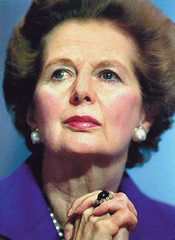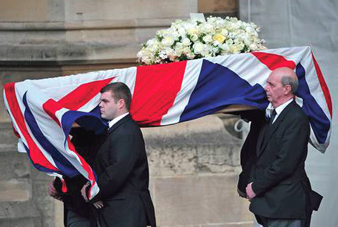The true legacy of Margaret Thatcher the ‘Iron Lady’
By Trevon Muhammad | Last updated: Apr 25, 2013 - 1:11:35 PMWhat's your opinion on this article?

Margaret Thatcher, former Prime
Minister of the United Kingdom.
|
Her detractors, many of whom poured into streets across the UK in celebration of her death, remember her ruthless defeat of the trade unions and believe she fostered the culture of greed which plagues Britain to this day.
Prior to Margaret Thatcher’s election, Britain was a socialist nation. Many businesses and utilities had been nationalized; run by the Government but owned by the public. Among these were utilities such as electricity, water and gas, the steel and mining industries as well as British Airways and British Leyland, which owned several car companies. The financial service sector was also strongly regulated.

Casket of Margaret Thatcher. Photo: Thabo Jaiyefimi
‘Her foreign policies were also a point of contention. She supported the White-supremacist regimes in South Africa and Rhodesia (Zimbabwe), declined to place sanctions on South Africa during apartheid and denouncing Nelson Mandela as a “common terrorist.’ |
In total, more than 50 state-owned companies were sold or privatized to “improve Britain’s economic performance” and raised $76.7 billion for the treasury. The public were also to benefit from being able to purchase shares and during the Thatcher years, the number of citizens who owned shares increased to 12 million up from 3 million at the time of her election. The financial sector was also deregulated as part of Thatcher’s plan and financial services becoming the center of the British economy. In 1979, financial services accounted for 3 percent of Britain’s GDP, when Thatcher resigned in 1990, it was 40 percent. At the same time Britain’s manufacturing slowed, leading to many factories being closed and Britain becoming a service economy.
In some instances, her policies were deemed successful. Some privatized industries were run more efficiently than ever before, which led to lower prices.
By 1996, domestic gas prices had fallen by nearly 25 percent since privatization; airport charges fell by nearly 10 percent; industrial gas prices fell by nearly 40 percent; and telecom prices fell by 40 percent.
In addition, through the Thatcher Government’s right to buy scheme, over 1 million people were able to purchase the homes they lived in at heavily discounted rates.
However today, many have accused private utility companies of profiteering. Following price hikes, British Gas last year made profits of $921 million, while its parent company, Centrica posted operating profits of $4.1 billion as the public were forced to turn up the heating due to the unusually cold weather.
Official statistics found that there were 4,206 more deaths than the average for the past five years in the first three weeks of March this year with pensioners accounting for the majority of casualties. Another 1,000 are expected to have deceased in the final week of the month. A recent survey of Western European nations revealed Britain to have the highest level of fuel poverty with 19 percent of the populations spending more than 10 percent of their income on adequate heating.
Sam Robertson, a campaigner with Fuel Poverty Action, recently called for an end to cold blooded profiteering and Caroline Flint, the shadow energy and climate change secretary said it was evident that there were problems within the power industry telling the Guardian, “These companies like to pretend they are the victims of wholesale prices, but they have been allowed to arrange their businesses in a way that enables them to make huge profits whatever the cost of wholesale energy.”
In addition, the council’s right to buy scheme may have profited those who took advantage of it, little of the proceeds were reinvested into new homes and today there is a severe lack of social housing;
Gerald Kaufman who was in charge of Labor’s house building program before the 1979 election was among those who opposed the Housing Act. He believed that it was a vote buying exercise which would result in severe long term social consequences.
“It certainly helped win them reelection in 1983. Who can blame the people who wanted to exercise their right to be a homeowner? They were given an opportunity impossible to resist, getting their house at a discount rate.”
However, Mr. Kaufman says that this policy resulted in all but poor quality housing being purchased leaving many homeless.
“It’s one thing, as (Harold) Macmillan said, to sell the family silver. It’s quite another to replace it.”
Caroline Davey, Shelter’s deputy director of policy and campaigns says millions of homes have been taken out of the social sector without being replaced and two million households languish on waiting lists. Ms. Davies further claims that more than one million children live in overcrowded housing and tens of thousands are trapped in temporary accommodations. “Every day shelter sees the devastating effect the shortage of affordable housing has on people, and how their lives could be vastly improved by a decent, secure home.”
At a 1991 high society banquet, Margaret Thatcher is reported to have told colleagues that it was their job to “glory in inequality” because as the rich got richer, wealth would trickle down to the poor. However, although her polices benefited the wealthy, statistics indicate that they had adverse effects on those in poverty.
Between 1979 and 1993, the richest tenth increased their incomes by 61 percent while the poorest tenth saw their takings fall by almost 20 percent. According to government figures, the number of people living in poverty almost tripled over this period, increasing from 5 million to 14 million, a quarter of the population at the time. More than 4 million of those in poverty were children, three times as many as when Thatcher’s Conservative government came to power in 1979.
Another hallmark of the Thatcher era was her attack and defeat of the trade unions which climaxed between 1984 and 1985 during the mining strikes. Prior to Ms. Thatcher, Trade Unions wielded great power with membership of 12.2 million in 1980. This led to millions of days of work being lost to strikes and the government questioning who really governed Britain.
Lord Tebbit, one of Lady Thatcher’s closest allies said, “The trades union generals had brought down Ted Heath’s Government. They brought down Jim Callaghan’s Government. They expected, particularly Master Scargill, to bring down her government, too.”
Margaret Thatcher introduced new laws which made it illegal to strike without a ballot and so when trade unionists led by Arthur Scargill decided to revolt against Margaret Thatcher’s plans to close coal pits which she deemed to be unprofitable, there were major clashes between police and miners on strike.
Over, 11,000 arrests were made and more than 8,000 people were charged. Having stocked a heavy supply a coal prior to the strike, the Thatcher Government was able to force miners to return to work after a year and accept the closures.
However some say that mining and manufacturing communities have never recovered and Anne Scargil the former wife of Arthur Scargill is among them. In a televised interview she told the BBC that she was “happy” to hear about Margaret Thatcher’s death, calling her an “evil” woman.
“She caused us such distress and upset, she just smashed our communities. She closed our manufacturing industries down, she closed mines, she was intent smashing the trade unions, and in it she smashed the country. She called us the enemy within; there were only one enemy within and that was her.”
Her foreign policies were also a point of contention. She supported the White-supremacist regimes in South Africa and Rhodesia (Zimbabwe), declined to place sanctions on South Africa during apartheid and denouncing Nelson Mandela as a “common terrorist”. Her belief that “my enemy’s enemy is my friend” led her to associate with grievous characters. Among them was General Pichonet, the Chilean dictator who assisted Britain during the Falklands war against Argentina. He is believed to have been responsible for the murder, torture and illegal detainment of over 40,000 people between 1973 and 1990. Nonetheless, Thatcher championed his cause as he battled extradition to Spain for human rights abuses, thanking him for “bringing democracy” to Chile.
General Pol Pot, leader of the Khemer Roque of Cambodia who is alleged to have caused the death of between 1 and 3 million people through a mixture of executions, forced labor, malnutrition, and poor medical care are also reported to have received support after being removed from power by the Vietnamese.
Despite the sharp division her policies invoked Margaret Thatcher was still afforded a state-subsidized funeral, with full military honors. The Queen and former Prime Minister Tony Blair were among the guests at her burial. However, despite militant police presence, there were still noticeable protests with hundreds turning their backs on her coffin as it passed. There were also chants of “what a waste of money” and “Tory scum”.
However, the great honor afforded to Ms. Thatcher by the British government in spite of great public anger could perhaps raise questions as to how leaders of the Black community are respected in their passing. Great Black leaders such as Marcus Garvey, Kwame Nkrumah, Patrice Lumumba and others fought hard to improve the condition of Black people and if Margaret Thatcher is worthy of such celebration and respect, maybe we should increase our appreciation of them.
INSIDE STORIES AND REVIEWS
-
-
About Harriett ... and the Negro Hollywood Road Show
By Rabiah Muhammad, Guest Columnist » Full Story -
Skepticism greets Jay-Z, NFL talk of inspiring change
By Bryan 18X Crawford and Richard B. Muhammad The Final Call Newspaper @TheFinalCall » Full Story -
The painful problem of Black girls and suicide
By Charlene Muhammad -National Correspondent- » Full Story -
Exploitation of Innocence - Report: Perceptions, policies hurting Black girls
By Charlene Muhammad -National Correspondent- » Full Story -
Big Ballin: Big ideas fuel a father’s Big Baller Brand and brash business sense
By Bryan Crawford -Contributing Writer- » Full Story






 Click Here Stay Connected!
Click Here Stay Connected!








